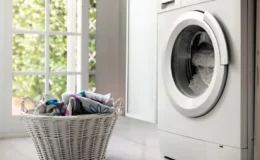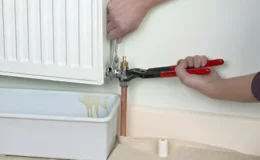🕑 4 minutes read

London's Landlords and Business Owners have a duty of care towards their tenants and employees and are responsible for keeping a safe and healthy environment within their properties. Part of that is managing the risk of Legionella with regular water risk assessments.
In this blog, we will discuss why the control of Legionella is important for landlords to consider when renting their properties. In London and the UK, property managers, landlords and business owners are legally required to consider the legionella risk in their businesses or properties. A Legionella risk assessment is the most effective way to manage this.
Understanding What Legionella Is?
Legionella is a type of bacteria that is capable of causing a highly severe form of pneumonia commonly known as Legionnaires' disease. This occurs when someone inhales contaminated water droplets. This bacterium breeds well in water systems, particularly warm and stagnant ones, making it a potential threat in homes and commercial premises.
London homeowners can rest assured that continuous occupancy of a home naturally maintains control over Legionella. The regular use of water systems through daily routines like flushing toilets, taking showers, and using sinks minimises the risk of Legionella. By keeping hot water flowing and consistently heated, Legionella bacteria are effectively eliminated, reducing the risk of infection.
Therefore, it is typically unnecessary for homeowners to conduct Legionella testing or Water Risk Assessments within their private residences.
 The most compelling reason for Legionella control is the protection of the health of your tenants. Legionnaires' disease can be a severe and even life-threatening illness. People with weakened immune systems, the older/ elderly, and smokers are particularly vulnerable. By maintaining effective control measures, you safeguard the health and well-being of the occupants in your home or business.
The most compelling reason for Legionella control is the protection of the health of your tenants. Legionnaires' disease can be a severe and even life-threatening illness. People with weakened immune systems, the older/ elderly, and smokers are particularly vulnerable. By maintaining effective control measures, you safeguard the health and well-being of the occupants in your home or business.
Financial Implications?
Controlling Legionella is an investment in the financial security of your home or business. In the unfortunate event of a Legionella outbreak, the financial implications can be substantial. It is essential to take proactive measures to avoid such incidents and mitigate the associated risks. Medical expenses, legal costs, reputational damage and potential compensation claims can severely impact costs. Therefore, you should protect your assets and financial stability by implementing proper control measures.
 Safeguarding Your Reputation
Safeguarding Your Reputation
Your reputation is invaluable, whether you're a homeowner or a business owner. A Legionella outbreak can tarnish your image and lead to a loss of trust from those who rely on your water systems. By prioritising control, you demonstrate your commitment to safety and hygiene, which can enhance your reputation and foster trust among your family, employees or customers.
Therefore, as a landlord, no matter the kind of property you look after, you have a duty to ensure it's safe for your tenants, visitors, and everyone else. You must follow safety rules and laws to protect everyone. These rules include the Health and Safety at Work Act, COSHH, ACOP L8, and other important guidelines.
Basic Water Risk assessments may show there's no significant risk as long as everything is being managed well. It's crucial to review this assessment if anything changes in the system. To keep the risk low, it's best to implement simple, proportional control measures like
Control Legionella risk through temperature:
Choose serviceteam, your trusted Legionella risk assessor in London.
In this blog, we will discuss why the control of Legionella is important for landlords to consider when renting their properties. In London and the UK, property managers, landlords and business owners are legally required to consider the legionella risk in their businesses or properties. A Legionella risk assessment is the most effective way to manage this.
Understanding What Legionella Is?
Legionella is a type of bacteria that is capable of causing a highly severe form of pneumonia commonly known as Legionnaires' disease. This occurs when someone inhales contaminated water droplets. This bacterium breeds well in water systems, particularly warm and stagnant ones, making it a potential threat in homes and commercial premises.
What Are Your Legal Responsibilities?
Landlords in London have a legal requirement to ensure their tenant's health and safety by keeping the premises safe and free from health hazards such as legionella bacteria that can build up in water systems. In order to assess and manage the risk of legionnaires disease, landlords can take action themselves, as the Health And Safety Executive has advised. However, Landlords use serviceteam for peace of mind, as we are accredited and trained in managing the risk of Legionnaires' disease through our comprehensive Legionella testing in London risk assessments.London homeowners can rest assured that continuous occupancy of a home naturally maintains control over Legionella. The regular use of water systems through daily routines like flushing toilets, taking showers, and using sinks minimises the risk of Legionella. By keeping hot water flowing and consistently heated, Legionella bacteria are effectively eliminated, reducing the risk of infection.
Therefore, it is typically unnecessary for homeowners to conduct Legionella testing or Water Risk Assessments within their private residences.
What Is The Health And Safety Risk?
 The most compelling reason for Legionella control is the protection of the health of your tenants. Legionnaires' disease can be a severe and even life-threatening illness. People with weakened immune systems, the older/ elderly, and smokers are particularly vulnerable. By maintaining effective control measures, you safeguard the health and well-being of the occupants in your home or business.
The most compelling reason for Legionella control is the protection of the health of your tenants. Legionnaires' disease can be a severe and even life-threatening illness. People with weakened immune systems, the older/ elderly, and smokers are particularly vulnerable. By maintaining effective control measures, you safeguard the health and well-being of the occupants in your home or business.How Do We Manage The Risk?
Legionella control is all about risk reduction. By implementing preventive measures and monitoring the water systems, you significantly reduce the chances of Legionella proliferation. This proactive strategy minimises risks and mitigates potential health hazards and costly consequences. Most residential properties have low Legionella risk due to regular water usage. For instance, a small housing unit with direct mains water supply for hot and cold water and simple outlets like toilets and basins falls into the 'low risk' category.Financial Implications?
Controlling Legionella is an investment in the financial security of your home or business. In the unfortunate event of a Legionella outbreak, the financial implications can be substantial. It is essential to take proactive measures to avoid such incidents and mitigate the associated risks. Medical expenses, legal costs, reputational damage and potential compensation claims can severely impact costs. Therefore, you should protect your assets and financial stability by implementing proper control measures.
 Safeguarding Your Reputation
Safeguarding Your ReputationYour reputation is invaluable, whether you're a homeowner or a business owner. A Legionella outbreak can tarnish your image and lead to a loss of trust from those who rely on your water systems. By prioritising control, you demonstrate your commitment to safety and hygiene, which can enhance your reputation and foster trust among your family, employees or customers.
Therefore, as a landlord, no matter the kind of property you look after, you have a duty to ensure it's safe for your tenants, visitors, and everyone else. You must follow safety rules and laws to protect everyone. These rules include the Health and Safety at Work Act, COSHH, ACOP L8, and other important guidelines.
What Should You Do?
Health and safety law for landlords of rental properties is about ensuring tenants' safety from Legionella bacteria without making it overly complicated.Basic Water Risk assessments may show there's no significant risk as long as everything is being managed well. It's crucial to review this assessment if anything changes in the system. To keep the risk low, it's best to implement simple, proportional control measures like
- Flushing the system before a new tenant moves in.
- Preventing debris from entering the system, especially in cold water tanks if you have them.
- Adjust the hot water cylinder temperature to store water at 60°C.
- Removing any unused pipework.
Control Legionella risk through temperature:
- Keep hot water storage cylinders at 60°C or higher.
- Ensure hot water is distributed at 50°C or higher, using thermostatic mixer valves when there's a scald risk.
- Store and distribute cold water below 20°C.
- Regularly have a competent person inspect and clean the system based on the risk assessment.
- Identify 'sentinel' outlets for monthly temperature checks.
- Monitor hot water storage cylinder and cold water tank temperatures.
- Prevent stagnation by removing dead legs in pipes, flushing infrequently used outlets at least weekly, and cleaning shower heads and hoses at least quarterly.
- Clean cold-water storage tanks periodically and inspect hot water cylinders for debris or corrosion.
- Design systems to minimise Legionella growth by keeping pipes short and direct, insulating pipes and tanks, and using materials that don't encourage Legionella growth.
Serviceteam Water Risk Assessments
Serviceteam offers legionella water testing and risk assessments in London and the surrounding areas. We offer competitive prices for both domestic and commercial properties. Our team of assessors are well aware of the necessity of Legionella testing, so they're ready to provide site-specific guidance to ensure the safety of your tenants or employees.Choose serviceteam, your trusted Legionella risk assessor in London.






